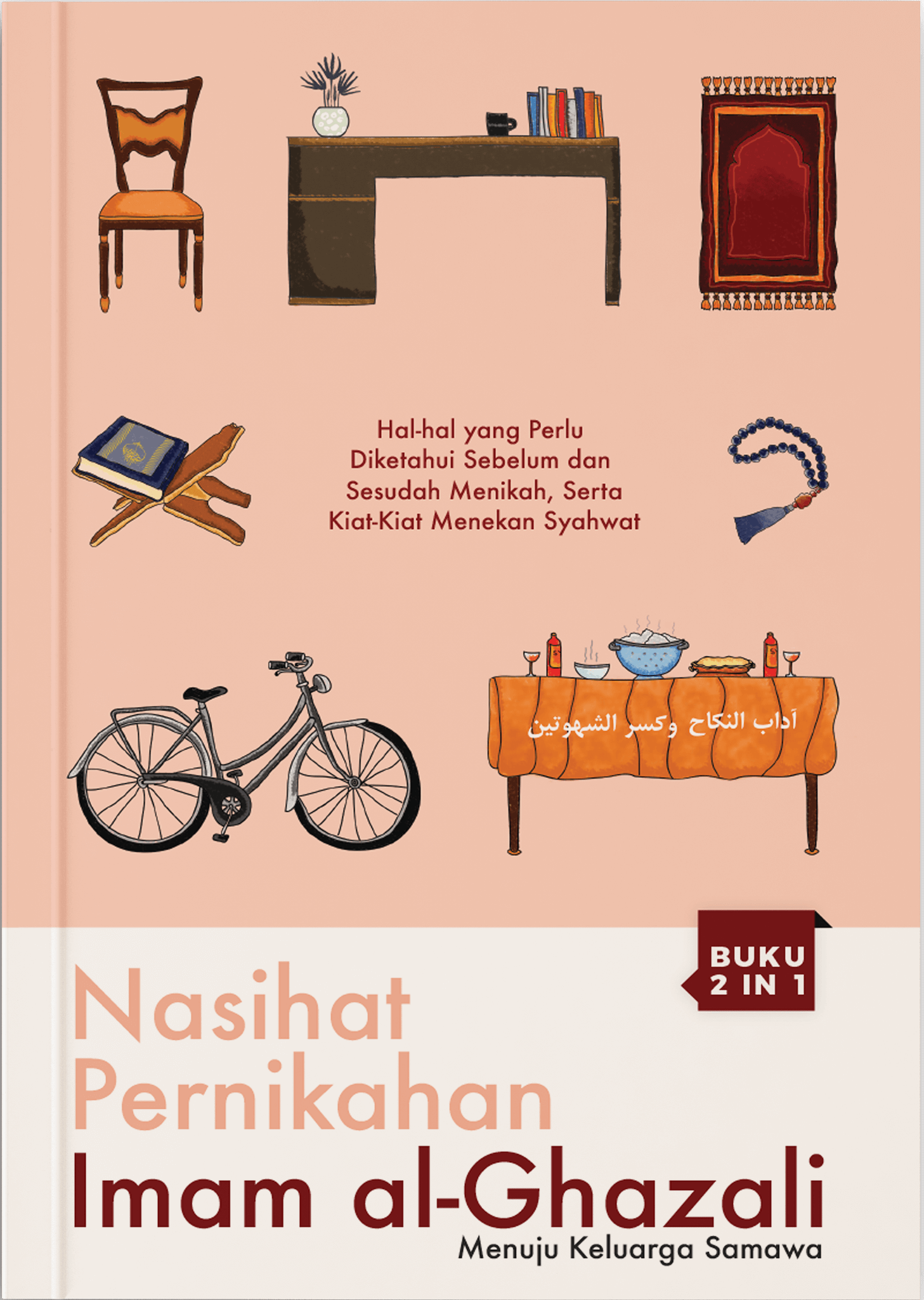
"Dan nikahkanlah orang-orang yang sendirian di antara kamu." (Q.S. An-Nur (24): 32) Pernikahan merupakan salah satu tanda kebesaran Allah SWT. Tapi mengapa, meski bertujuan mulia, banyak pernikahan yang tidak bahagia dan berakhir cerai? Bahkan, pasangan yang dianggap paling serasi sekalipun tak luput dari isu perceraian keluarga. Sebenarnya bagaimana agar pernikahan kita selalu mendapatkan kondisi sakinah, mawaddah wa rohmah, serta tidak karam sebelum sampai tujuan? Pertama, yang perlu diingat, tidak ada pernikahan yang sempurna. Kebahagiaan pernikahan adalah proses yang dilalui bersama. Kedua, ikuti saja Nasihat Pernikahan karya Imam Al-Ghazali ini. Ditulis sejak abad ke-12 M, buku ini merupakan kitab referensi abadi soal pernikahan yang sederhana tapi mengena, dan masih kontekstual dengan zaman sekarang. Dalam buku ini, beliau memberikan nasihat-nasihat dasar soal persiapan pernikahan, prosesi pernikahan hingga kiat-kiat menekan syahwat perut dan kemaluan. Sebuah buku yang sangat penting untuk siapa pun yang mau menikah maupun pasangan yang sudah menikah, guna mewujudkan keluarga yang samawa (sakinah, mawaddah, wa rohmah).
Author

أبو حامد الغزالي Muslim theologian and philosopher Abu Hamid al-Ghazali of Persia worked to systematize Sufism, Islamic mysticism, and in The Incoherence of the Philosophers (1095) argued the incompatibility of thought of Plato and Aristotle with Islam. Born in 1058, Abū Ḥāmid Muḥammad ibn Muḥammad al-Ghazālī ranked of the most prominent and influential Sunni jurists of his origin. Islamic tradition considers him to be a Mujaddid, a renewer of the faith who, according to the prophetic hadith, appears once every century to restore the faith of the ummah ("the Islamic Community"). His works were so highly acclaimed by his contemporaries that al-Ghazali was awarded the honorific title "Proof of Islam" (Hujjat al-Islam). Al-Ghazali believed that the Islamic spiritual tradition had become moribund and that the spiritual sciences taught by the first generation of Muslims had been forgotten.[24] That resulted in his writing his magnum opus entitled Ihya 'ulum al-din ("The Revival of the Religious Sciences"). Among his other works, the Tahāfut al-Falāsifa ("Incoherence of the Philosophers") is a significant landmark in the history of philosophy, as it advances the critique of Aristotelian science developed later in 14th-century Europe. أبو حامد محمد الغزّالي الطوسي النيسابوري الصوفي الشافعي الأشعري، أحد أعلام عصره وأحد أشهر علماء المسلمين في القرن الخامس الهجري،(450 هـ - 505 هـ / 1058م - 1111م). كان فقيهاً وأصولياً وفيلسوفاً، وكان صوفيّ الطريقةِ، شافعيّ الفقهِ إذ لم يكن للشافعية في آخر عصره مثلَه.، وكان على مذهب الأشاعرة في العقيدة، وقد عُرف كأحد مؤسسي المدرسة الأشعرية في علم الكلام، وأحد أصولها الثلاثة بعد أبي الحسن الأشعري، (وكانوا الباقلاني والجويني والغزّالي) لُقّب الغزالي بألقاب كثيرة في حياته، أشهرها لقب "حجّة الإسلام"، وله أيضاً ألقاب مثل: زين الدين، ومحجّة الدين، والعالم الأوحد، ومفتي الأمّة، وبركة الأنام، وإمام أئمة الدين، وشرف الأئمة. كان له أثرٌ كبيرٌ وبصمةٌ واضحةٌ في عدّة علوم مثل الفلسفة، والفقه الشافعي، وعلم الكلام، والتصوف، والمنطق، وترك عدداَ من الكتب في تلك المجالات.ولد وعاش في طوس، ثم انتقل إلى نيسابور ليلازم أبا المعالي الجويني (الملقّب بإمام الحرمين)، فأخذ عنه معظم العلوم، ولمّا بلغ عمره 34 سنة، رحل إلى بغداد مدرّساً في المدرسة النظامية في عهد الدولة العباسية بطلب من الوزير السلجوقي نظام الملك. في تلك الفترة اشتُهر شهرةً واسعةً، وصار مقصداً لطلاب العلم الشرعي من جميع البلدان، حتى بلغ أنه كان يجلس في مجلسه أكثر من 400 من أفاضل الناس وعلمائهم يستمعون له ويكتبون عنه العلم. وبعد 4 سنوات من التدريس قرر اعتزال الناس والتفرغ للعبادة وتربية نفسه، متأثراً بذلك بالصّوفية وكتبهم، فخرج من بغداد خفيةً في رحلة طويلة بلغت 11 سنة، تنقل خلالها بين دمشق والقدس والخليل ومكة والمدينة المنورة، كتب خلالها كتابه المشهور إحياء علوم الدين كخلاصة لتجربته الروحية، عاد بعدها إلى بلده طوس متخذاً بجوار بيته مدرسةً للفقهاء، وخانقاه (مكان للتعبّد والعزلة) للصوفية.